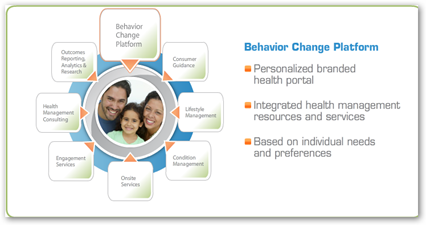I did a quick trip through my archives and came up with a few examples of insurers owning and buying wellness companies and there’s lot more than I have listed here. I thought this was good to actually see a few of them.
UnitedHealth Buys Another Wellness Company – Biometric Monitoring For Data With Employer Contracts
Behavioral Underwriting With Biometric Employee Screenings – Red Brick Secures 3 More Clients
WellPoint enters wellness program partnership With Red Brick – Behavior Based Health Insurance..
Blue Shield in Washington Buys Wellness/Fitness Company – Venture Capital Investors Were Pleased With ROI
Humana To Purchase Concentra Wellness In Texas Offering Coupons and An Entire Portfolio of Health Programs and Clinics
Humana Acquiring Harris, Rothenberg International–Wellness and HR Services for Employers Providing Health Insurance
With subsidiaries anymore you don’t always know who owns who and what subsidiary queries their data with other corporate subsidiaries under the same umbrella and if not what they sell in the way of data. Red Brick for example that WellPoint contracted with in the link is a client of Ingenix (now Optum Insights a sub of UnitedHealthcare) that provides the analytics for the Red Brick wellness program so see how they all somewhat run together too?
I wrote about the Penn State/WebMD portal as well and there are very few clients under the WebMD Health services area and Penn State needs money and if you get enough participants entering data then they have less data to sell. This is an epidemic and de-identified data from medical records is being sold as well, like United Healthcare selling data from the Mayo Clinic so your is for sale in more places than you realize. I went over to the WebMD site to see what information they had out there on the portal services and I about choked at the presentation too. All over the place you get the message as a client that you need to focus on “behavior change” for everyone. You need this platform and data entered to “fix” everyone:)

There’s the standard tools with BMI and so forth that you see everywhere and get information along with some costs. They want all members to “model” their healthcare. Tell me how many people are going to log on all the time and work this portal, it’s like a PHR, you use it when you need it and PHRs have never caught on big either. They have connections to 3rd party solutions on here as well and they show a scale so I am assuming we have those devices that collect and sells data too.

You have to “drive” your health solutions for success it says. I found the focus on “fixing behaviors” out there a little too much. I understand incentives and so forth and normal coaching but this sell on this portal is expecting too much from participants, again the more data entered, the more data and/or data profiles for sale. Here’s another one I found a bit overdone that’s a partner of United Healthcare. You know when you don’t understand a multiple page privacy statement and the terms of use, they are selling data and again as I said we have no clue how subsidiaries of health insurance companies may be sharing and querying data at all.
Portal for Personalized Wellness Programs, More Data to Scrape and Mine…And One Heck of a Terms of Use Page, Enough to Scare Any Consumer…
I think the marketing push on wellness programs is a little much as clients get Algo Duped when the old technique of “throw numbers at them” is engaged to make a sale, and I spent 25 years as an outside sales person so I see these things coming at times. Thus so when something like this is too strongly presented with telling a client that they can reach certain plateaus with “fixing” members and gathering their data to make it work is a little bit of a farce if you will and we don’t want the members being the “evil twin” if they don’t enter enough data. I look at both sides. Scroll down to the footer of my blog and watch the first video, “Context is Everything” for more on how reports and numbers can dupe you when used out of context as well.
So this is good that the lawmaker from New York wants some rules in place as there should be some parameters and standards in place as the big  fear we all have is data used out of context and we have seen it but with complexities and more math in everything today the envelope gets pushed. Here's a post from November of last year on that topic at the link below with a good video and the big companies are talking and are not even sure what the quants and actuaries are to do with a lot of this data yet and how to find the value. NASA is one of the participants. Even Larry Ellison said in an interview referencing the NSA situation to be more concerned over banks and other entities that have data about you as credit cards and others have 30 years worth of data about you guess what insurance companies are buying it from them. You can look that post up here if you like.
fear we all have is data used out of context and we have seen it but with complexities and more math in everything today the envelope gets pushed. Here's a post from November of last year on that topic at the link below with a good video and the big companies are talking and are not even sure what the quants and actuaries are to do with a lot of this data yet and how to find the value. NASA is one of the participants. Even Larry Ellison said in an interview referencing the NSA situation to be more concerned over banks and other entities that have data about you as credit cards and others have 30 years worth of data about you guess what insurance companies are buying it from them. You can look that post up here if you like.
Big Data/Analytics If Used Out of Context and Without True Values Stand To Be A Huge Discriminatory Practice Against Consumers–More Honest Data Scientists Needed to Formulate Accuracy/Value To Keep Algo Duping For Profit Out of the Game
When it comes to medication adherence we have all the seen the FCIO analytics scam to where they query your credit information with other data they have or buy and score you from 0 to 500 on compliance on taking your meds. That is one big dupe right there for any insurer or pharma company to buy but they will do it if that data can be queried with other data to show “some numbers” that will allow them to cut costs somewhere or deny a payment.
That’s what the link above talks about, the big discrimination practice against consumers with using numbers in any context they feel like to find a way to segment something to make a decision. You can check out the videos on the Algo Duping page as well to see more about how math models and subsequent algorithms compute this and again the humans better put the correct context in here and not use data from the scams like FCIO as I talked about above a decision making criteria. All data and analytics is not correct, doesn’t carry ethics and can be used out of context at any time. The more data being sold out there also contributes to the ever rising errors we are seeing.
Attack of the Killer Algorithms – “Algo Duping 101″
So hats off to Representative Louise M. Slaughter for digging in here and again so much of this comes back around to money attached to selling data at times. When an employer pushes it like Penn State did, read between the lines to see why their implementation was not "friendly”. Again too the decision maker at Penn State could have been Algo Duped as well with the marketing of this portal to be a “fix” for all and money in the pocket too. BD
A federal lawmaker is asking the Equal Employment Opportunity Commission to investigate employer wellness programs that seek intimate health information from employees, and to issue guidelines preventing employers from using such programs to discriminate against workers.
The request, by Representative Louise M. Slaughter, Democrat of New York and a staunch advocate for health privacy rights, came a few days after Pennsylvania State University suspended part of its new employee wellness program that had drawn objections from faculty members.
“What happened at Penn State was appalling to me,” Ms. Slaughter said in an interview on Tuesday, referring to the university’s requiring employees to pay a monthly surcharge of $100 if they did not fill out detailed health risk questionnaires.
Called Take Care of Your Health, the Penn State program initially required employees, including faculty and staff members, to fill out the questionnaires — which asked about workplace stress, marital problems and women’s pregnancy plans — or pay the surcharge. After faculty members complained that the program seemed coercive and invaded their privacy, the university suspended the penalty.
The Equal Employment Opportunity Commission had a special meeting in May on wellness programs in which its legal expert concluded that the agency should issue guidance on the potential intersection of wellness programs and federal antidiscrimination laws. In particular, the expert said, the agency should clarify the meaning of “voluntary” employee participation.
But it has yet to issue that guidance, prompting Ms. Slaughter’s letter. “I’m deeply upset with the E.E.O.C. for delaying this,” she said.
http://www.nytimes.com/2013/09/25/business/rules-sought-for-workplace-wellness-questionnaires.html



0 comments :
Post a Comment